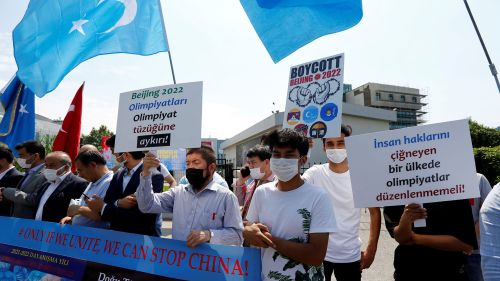Conditional US Support for Humanitarian Intervention

Chicago Council Surveys have found that Americans are largely supportive of humanitarian intervention, but this varies in specific cases.
Each year on December 10, the world recognizes Human Rights Day to mark the anniversary of the United Nations General Assembly adoption of the Universal Declaration of Human Rights in 1948. The day is sure to be marked by statements from high-ranking US government officials reaffirming the importance of defending human rights around the world. However, public support for humanitarian engagement and intervention remains a complex topic.
In recent Chicago Council Surveys, Americans express favorable opinions of using humanitarian tools to meet US foreign policy objectives. A plurality of Americans says the country is not using humanitarian tools such as sharing vaccines, combating hunger, and providing disaster relief enough (45%). When asked in 2020, 82 percent of Americans said that the United States should use humanitarian aid as a foreign policy approach the same amount or more than the country does now.
Chicago Council Surveys have also found consistent and strong support for formalizing international atrocity prevention and response measures. In a trend that has been largely stable since 2002, 71 percent of Americans support US participation in the agreement on the International Criminal Court that can try individuals for war crimes, genocide, or crimes against humanity.
Humanitarian Goals Not a Top Priority
Despite high levels of support for the use of humanitarian foreign policy tools, Council data show that promoting and defending human rights is not a top priority for Americans compared to other foreign policy goals. In general, Americans tend to see initiatives with more tangible economic and security payoffs as the most important elements of US foreign policy, with only four in 10 classifying promoting and defending human rights as very important (41%).
One reason Americans may not prioritize these interventions is because they do not seem to think implementing a humanitarian foreign policy will bolster the global influence of the United States. Only 44 percent of Americans think that promoting democracy and human rights around the world is very important for remaining influential on the global stage. Out of 12 factors that Americans were asked about as a part of this question, this item ranked ninth for consideration as very important.
Use of US Troops for Humanitarian Intervention
Chicago Council Surveys find that Americans are largely supportive of humanitarian intervention in the abstract, but not necessarily in concrete situations. From 2004 to 2017, consistent majorities across partisan affiliations supported using US troops “to deal with humanitarian crises.” Slightly larger majorities across parties also supported using troops “to stop a government from committing genocide and killing large numbers of its own people,” when asked between 2002 and 2018.
In an article titled “The Pretty Prudent Public: Post Post-Vietnam American Opinion on the Use of Military Force,” Nonresident Senior Fellow Bruce Jentleson discusses an experiment studying American public opinion on the limited use of military force in the 1980s. In the eight cases examined, Americans showed that they are most likely to support military intervention if they feel their own country, US interests, and/or their allies’ interests are being threatened. After their own interests, Americans are most likely to support intervention in humanitarian situations. Notably, the study shows that Americans are not at all likely to support regime change or involvement in another country’s internal politics.
Council polling finds that when Americans are asked about specific, real-world humanitarian crises rather than hypothetical ones, their support for military intervention decreases. For example, in 2018, while 77 percent of Americans said they would support using US troops to stop a foreign government from committing genocide, the same poll showed that only 42 percent supported using US troops to stop the Rohingya genocide in Myanmar. However, it should be noted that a lack of understanding about the Rohingya genocide among the American public may be partially responsible for low public support for humanitarian intervention.
Syria is another example. A 2017 Council poll showed that 73 percent of Americans favored using US troops to stop a government from using chemical or biological weapons against its own people. Despite this support, a 2013 Pew poll found that just 28 percent of Americans favored the use of US military airstrikes against Syria (63% opposed it), even when question wording included the fact that the Syrian government used chemical weapons against its own citizens. This lower support in the concrete example of Syria likely reflects the perception that the conflict in Syria was a complicated civil war with internal political consequences, and not strictly a humanitarian situation.
Working with International Partners
Notably, data show that working with international partners may increase public support for humanitarian intervention. In 2015, Council polling found that Americans were slightly more willing to intervene to stop a government from committing genocide when working as part of a United Nations Security Council (UNSC) authorized mission (71%) than they would be to intervene unilaterally (65%). In fact, when asked in 2010, two thirds (66%) of Americans believed that the UNSC had the responsibility to authorize the use of military force to prevent genocide.
In the end, support for humanitarian aid and intervention is dependent on the situation. If it is low cost, low risk, and multilateral, the US public may be more likely to support it; however, if the situation is seen as intervention in an internal conflict or regime change, the public more often indicates that it wants to avoid getting involved.





